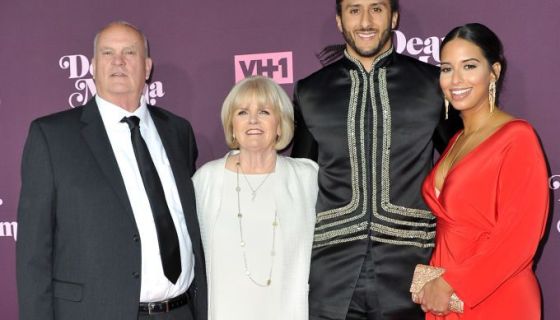Colin Kaepernick is opening up about his childhood with white adoptive parents, accusing the couple that raised him of perpetuating racism in a new interview.
Source: Allen Berezovsky / Getty
In a new interview with CBS Chicago, the former NFL star admits that he struggled growing up in a “problematic” household, which is something he details in his upcoming graphic novel, Change the Game.
“I know my parents loved me, but there were still very problematic things that I went through,” Kaepernick told the outlet. “It was important to show that, no, this can happen in your own home, and how we move forward collectively while addressing the racism that is being perpetuated.”
Kaepernick’s graphic novel tells the story of his journey from high school into his storied athletic career, heavily centering around his lack of choice in his future. His parents, in particular, tried to steer him in a direction they thought was best, which ended up resulting in several fights between them and their adopted son.
One of these disagreements, which is illustrated in the novel, was over his choice of hairstyle.
In an effort to pay tribute to beloved basketball player Allen Iverson, Kaepernick wanted to embrace his blackness by wearing cornrows–but his mother pushed back on the idea.
“He’s getting what rolls?” his mother, Teresa, is cited as saying in the book.
In real life, she allegedly told him: “Oh, your hair’s not professional. Oh, you look like a little thug.”
This one conversation with his mother has made a continued impact on Kaepernick’s life decisions into adulthood, he said, even influencing his now-famous afro hairstyle.
“It also is informed why I have my hair long today,” Kaepernick said this week.
Ultimately, Colin revealed that his inability to find racial harmony in his own home is what encouraged him to find community elsewhere. That’s why he chose to pursue a career in football instead of one in baseball– both of which prospects were equally achievable—because there were significantly more black players in the NFL than MLB.
Still Kaepernick, says he hopes to return to the turf, which he hasn’t seen since his 2016 after being ousted for kneeling during the national anthem in protest of police brutality and racial injustice. In the years since, he has worked as an activist and advocate for social justice issues, also creating a Netflix documentary with Spike Lee that will detail his NFL protests.



